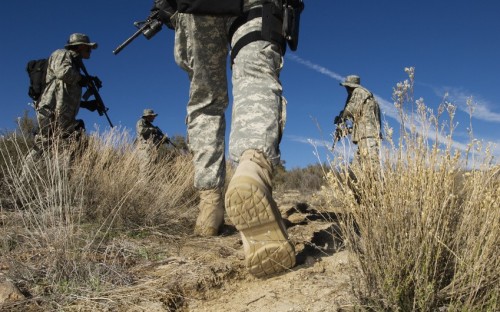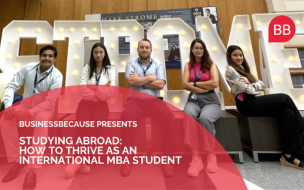Abdominal cancer cruelly cut his service short, but he developed a taste for business during a “shore tour” of the Pentagon, the US Department of Defence headquarters.
He is a man not shaken by change. “All pilots are trained to handle catastrophic failures through emergency procedures, in order to keep you alive,” says Jason, an MBA student. “Operating in this kind of dynamic environment truly prepares you for the entrepreneur’s life,” he says.
He is a big advocate of business school as a tool to transition back into civilian life. A student of UNC's Kenan-Flagler Business School in North Carolina, he illustrates the way military veterans can find rewarding careers in business management. “I have found the time invaluable,” says Jason.
A swelling number of former and current military personnel are turning to the front lines of business. According to a survey of 22,300 US students by educational network Military MBA, the percentage of military leaders enrolled in MBA programs nearly doubled over two years, to 8.1% in 2012.
“There is convergence, coming from greater demand of military students combined with increased acceptance from MBA schools,” says Greg Eisenbarth, executive director of the network.
But there is larger growth still, in enrolment for online programs. Veterans and members of the US military make up 25% of candidates enrolled in UNC’s online MBA courses. At Indiana University, they account for 15% to 20% of each graduating online class.
“We have seen members from all branches and levels of military service turn to higher education,” says Jana Stern, associate director of admissions at the W.P Carey School of Business in Arizona. About 13% of Carey’s MBA students are veterans or active military, she says.
These figures are likely to expand. According to the Institute for Veterans and Military Families, a research centre, 1.5 million service members will enter the civilian workforce through 2019, a result of the withdrawal of US forces in Afghanistan, and military budget cuts.
Business schools are attractive because they provide a “step up in making the transition to civilian life”, says Nicole Hartings, director of graduate student engagement at W.P Carey.
“An MBA program provides a shared business language,” she says, which veterans can use to communicate transferable skills in a way that civilian employers understand.
In the US, there are also strong financial incentives. The Servicemen’s Readjustment Act, government legislation known as the G.I Bill, provides financial support for education to individuals with at least 90 days of military service.
According to data compiled by the US Department of Veterans Affairs, the G.I Bill has provided financial support to 773,000 veterans and their families, amounting to more than $20 billion in funding.
Many high-ranking business schools also offer scholarships for military veterans. NYU Stern in New York, for instance, covers full MBA tuition – currently $60,744 a year – for military members and veterans through its Military Veterans Scholarship.
“Many veterans joined the military to feel a sense of purpose, and upon transitioning to civilian life they want to continue to feel this sense of purpose in their future careers,” says Isser Gallogly, assistant dean of MBA admissions at NYU Stern.
Military veterans have experience leading large teams and solving complex problems, he says, “skills which are critical to success in business school and beyond”.
Graduates often share their experiences of business school through military networks, and that can spur others to follow a similar path, says Stacey Rudnick, director of MBA career management at McCombs School of Business in Texas. “That is for many people new information,” she says.
As a result, about 8% of the business school’s full-time MBA class come from the military, says Stacey, rising to around 12% for other programs for working professionals.
McCombs MBAs in particular are able to benefit from financial support with the Hazlewood Act, legislation which exempts veterans in Texas from paying tuition and required fees on state-funded courses.
“The Hazelwood [Act] alone or paired with the federal benefits would cover the full tuition amount, but no elective fees like global trips,” says a financial aid officer at a leading US business school.
Veterans are valued because they add diversity to MBA cohorts, something America’s business schools strive to achieve, but are often behind compared with programs in Europe.
“We have students who were fighter or helicopter pilots, Navy SEALS and submarine officers, coast guard [workers], and students who were in cyber command,” says Sara Neher, dean of admissions at Virginia’s Darden School of Business.
The military is a “major industry” that Darden sources MBA students from, she adds, with up to 8% of recent cohorts coming from the armed forces, and a larger percentage in the Executive MBA program.
It is a similar story across the Atlantic, according to David Simmons, MBA admissions director at the UK's Cranfield School of Management. “It’s the old cliché that you learn as much or more from your peers – so 'powerful stories' are a very key part of the learning experience,” he says.
Cranfield, based near London, is unique in that it offers an MBA program designed for military officers, civil service personnel and defence industry executives – the Executive MBA (Defence).
“The leadership qualities and the inherent discipline that many in the military demonstrate make them potentially very attractive to the commercial world,” says David.
A strong sense of community can be found at business schools, with many forming military and veterans’ clubs. MIT’s Sloan School of Management and UCLA’s Anderson School of Management, for example, both run Veterans Associations.
“Veterans clubs understand the difficulties transitioning service members go through, and offer a tight knit community to fill the void left from leaving your fellow soldiers,” says Jason, the student at Kenan-Flagler Business School.
He spent last summer working at the United Services Automobile Association, a Texas-based Fortune 500 financial services group targeted at the military community.
There are a wide range of qualities typical of military veterans that are transferable to management careers, according to Isser at NYU Stern. “They have strong collaboration and interpersonal skills, making them invaluable on a team,” he says.
Dan Coben, assistant director of the graduate career centre at W.P Carey, says MBA graduates with military backgrounds are often in demand for project management and supply chain management roles. “More than 85,000 people and 1,800 tons of equipment don’t get to Afghanistan by themselves,” he says.
They are also in demand for regulatory compliance, risk management and data analysis positions in financial services, he adds. “Businesses use the same concepts and processes of identifying potential threats and making investment decisions.”
Sara at Darden says the school has military alumni in technology, operations, general management, consulting and finance roles – including at JP Morgan, McKinsey & Company and Amazon.
Investment banks in particular value veteran MBA graduates, according to Stacey at McCombs. “They see people who are highly competitive, driven and have lots of stamina,” she says.
But this should be unsurprising, she adds. Military officers can find themselves immediately in charge of dozens of people, major equipment, and large scale operations. “Trial by fire turns out to be a good training ground for future managers,” Stacey says.
RECAPTHA :
5e
df
79
c8








